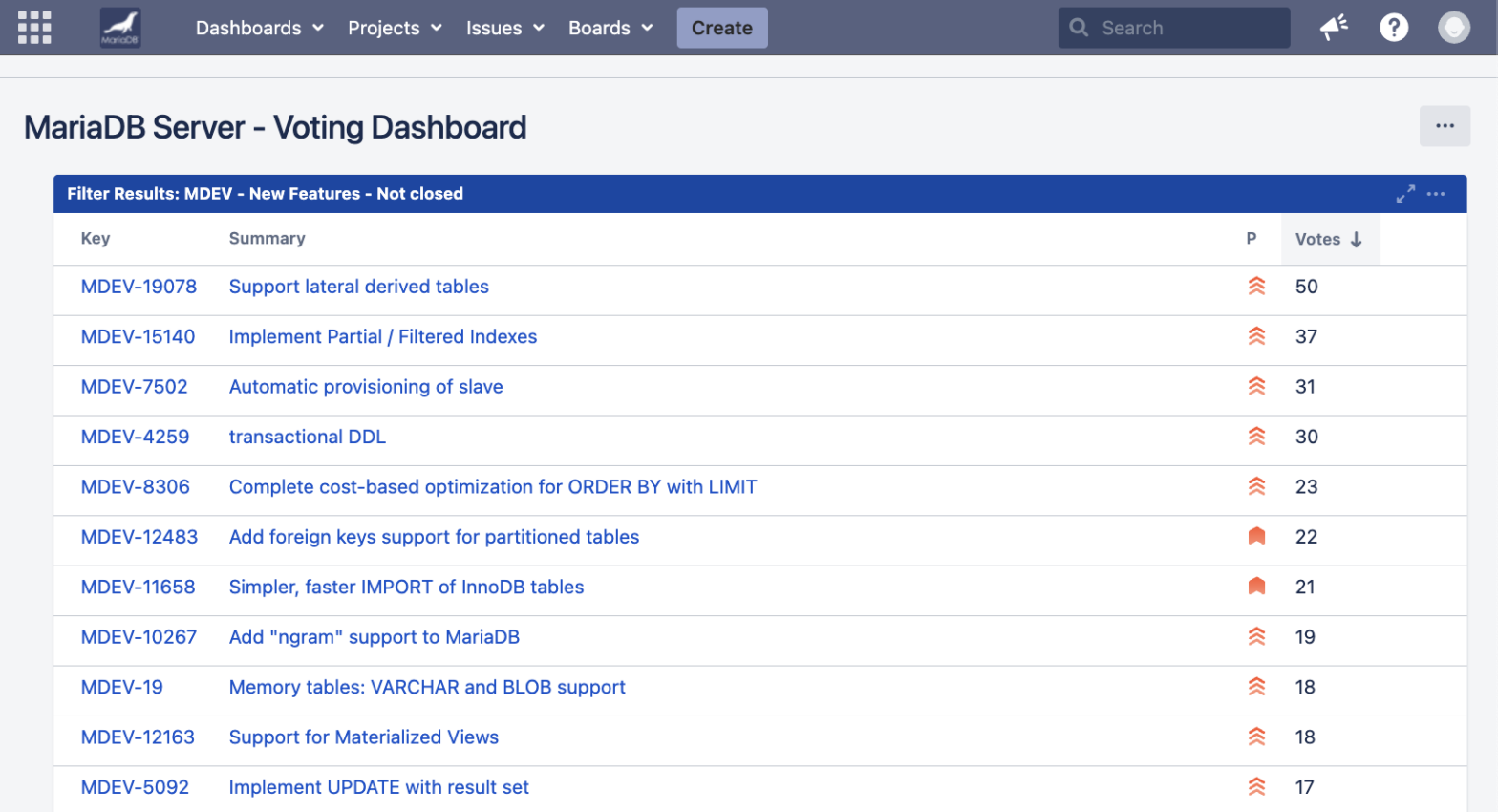Tag Archives: community
We are thrilled to welcome Scarf as a Gold Sponsor of the MariaDB Foundation!
Scarf’s commitment to improving open source distribution and visibility aligns closely with our mission to ensure the continued openness, innovation, and sustainability of MariaDB Server. As a platform that helps open-source projects understand and grow their user base, Scarf brings unique value to the ecosystem—not just through sponsorship, but through actionable insights that benefit the broader community.
For the MariaDB Foundation, understanding who uses MariaDB—and how, where, and why—is key to making better decisions. Scarf’s privacy conscious analytics help us move beyond assumptions and anecdotes, giving us real-world data to guide our outreach, improve our documentation, tailor our events, and strengthen our developer ecosystem.
…
Continue reading “Scarf Joins as Gold Sponsor of the MariaDB Foundation”
MariaDB has had a voting feature in its issue tracker Jira since the dawn of time, but it hasn’t got much active attention. Despite that, there are now many Jira community items that have collected a fair amount of votes over the years.
Many items are now in limbo—not on the MariaDB road map, but not rejected either. We would like to better understand how to act on these.
More votes, and preferably more detailed comments on syntax and desired functionality or insights on use cases, would help the MariaDB Foundation and Corporation a lot in deciding what to do and how to prioritize resources.
…
Good news! cPanel, one of the leading control panels in the hosting world has just announced that they are going to make MariaDB Server the default database when installing new cPanel instances. This change is slated to occur in version 122 of cPanel & WHM, coming in Q3 of 2024. We at MariaDB Foundation are very happy about this decision and are looking forward to continuous collaboration, to the benefit of our users and the MariaDB Server project.
We think that this is a great decision for cPanel users because we at MariaDB have stayed true to the original values of MySQL, including:
- Long term backwards compatibility
- Painless upgrades and ease of use
- Long term stable releases;
…
Continue reading “MariaDB Server will be the default database in cPanel”
It’s been a while since we posted about community organised events. I’m happy to have the chance to talk about my experience attending Percona University in Athens.
For those in a hurry, the main topics are:
1. Databases in the cloud, why vendor-lock is important to consider.
2. How to build Open Source databases, FerretDB and TiDB, two completely different approaches.
3. Upgrading from MySQL 5.7, monitoring and AI to speed up things.
Seeing familiar faces, discussing database experiences
When working within the MariaDB Foundation, it isn’t always easy to get feedback on what works and what doesn’t.
…
Continue reading “Attending Percona University in Athens 2023”
We are in October, which means it has been 4 months since the last metrics report. It is, therefore, time for another quarterly metrics report (plus a bit more). The extra month was to allow for an announcement which is a prerequisite for this post, and it also means we are more or less aligned to real quarters. The major changes to this will come in the second half of this post, we have lots of additional data for pull requests. With that, let’s get started.
(more…) …
Continue reading “MariaDB Contribution Statistics, October 2023”
Coding standards are often as hotly debated as vim vs emacs and other developer arguments. Viewers of the show Silicon Valley will all know the “tabs vs spaces” scene and how passionate people can be about it. Whilst I do personally have a preference (I’m not sharing it here), I feel it is much more important that people stick to one standard for a code base.
Standards Story
Several months ago a new community developer for MariaDB Server sent me a message asking where to find our coding standards document. After a bit of searching I realised we did not have one, and if we want to onboard new developers we definitely should have one.
…
Back in December, we asked for your feedback on implementing a code of conduct in the MariaDB Server community. We have seen some great feedback and observations from this and today we are have published version 1.0 of our code of conduct.
Feedback
The feedback we have received has been generally positive both when it comes to implementing a code of conduct in general, and to the content of the text.
That said, it was suggested by Brian Andrus that we better define “inflammatory language”; this is something we actually discussed internally prior to the draft content.
…
Yes, it is a bit of a click-bait title, but in this case running one SQL command did improve a community user’s performance by that much. It could help you too.
The story
A community user posted in a couple of places that when migrating a large WordPress installation to MariaDB that they were seeing a certain query performing terribly. The query was taking 1.5 seconds to execute and it was clear from the explain plan that the optimizer was not making an ideal decision about the join order.
The query was generated by WordPress so it would not be easy to force an index, or rewrite the query.
…
Continue reading “This one trick can make MariaDB 30x faster!”






